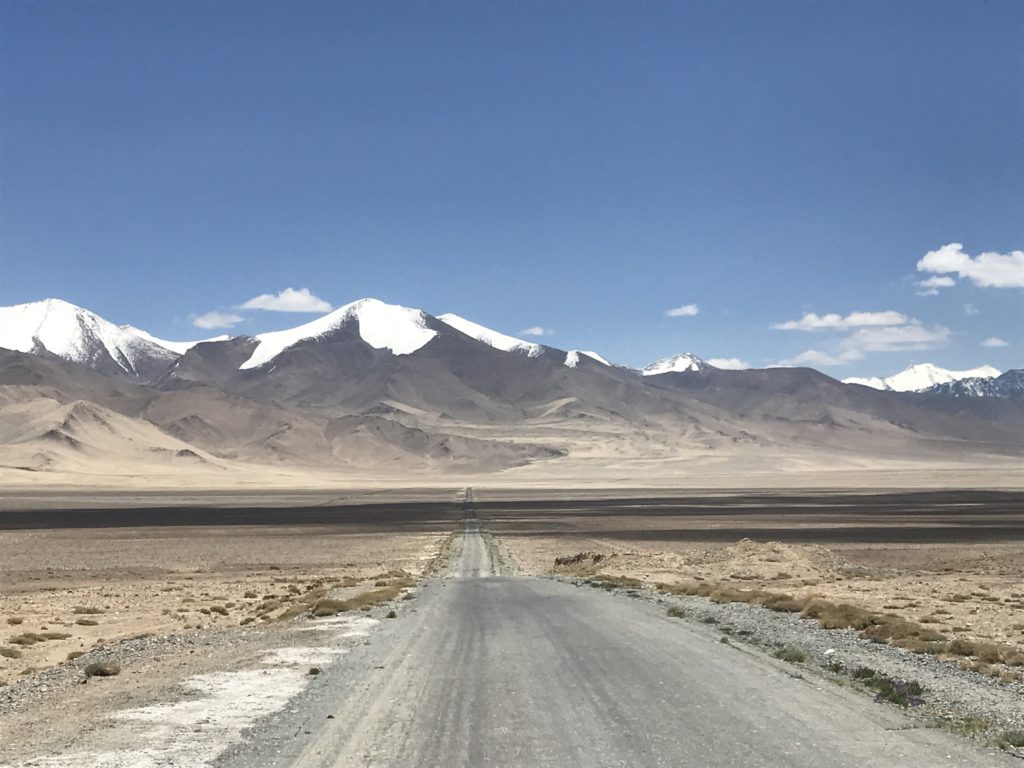June/July 2018, 400km, 12 days
Over 12 days I ran across Tajikistan, from the border with Afghanistan to the border with Kyrgyzstan, reaching an altitude of over 4000m.
“Why aren’t you cycling?”
This was a reasonable question. I was in a place that received few visitors, and those that did come would often be on two wheels. Bicycle tourists traversing Tajikistan would predominantly stick to the famous Pamir Highway, the ancient Silk Road trading route that ran further south, but a few would head this way.
I had reached the village of Razudj, 80km along the narrow dirt track that follows the Bartang River through the Western, lower section of the Bartang Valley and eventually reaches Lake Karakul. It had taken two days of steady running through its deep rocky canyons with high, grey walls, to get here. The road, gradually easing its way upwards, had been empty, but there was plenty of life in the villages that had been settled on the occasional patch of fertile green land. Passing through, I’d been warmly welcomed with offers of tea and bread and hadn’t been shy about accepting. Approaching some isolated houses, a group of ladies had waved frantically, beckoning for me to cross the fast-flowing river via the small footbridge that led to their home on the hillside. A large red rug had been laid out on the lawn, a walnut tree providing shade to the women now sitting there, busily sewing and drinking mid-morning tea. A decorated teapot was produced as I relaxed and with a grimy sweat still pouring out of me, tried to maintain an air of civility.
“Milk?”, my hostess asked. She made a two-handed gesture indicating it would need to be squeezed warm from a nearby animal, which I guessed would be a goat. I politely declined, without explanation. I didn’t think this was the time to bring up my lactose intolerance.
Upon arrival in Razudj, I’d asked around for a place to stay and was soon ushered into a traditional Pamiri home next to a small stream. I’d been sat down in the cool, dark living room and allowed to recover with a thick soup followed by salty fish. An older man came in, looked at me and shook his head. Now I was centre stage as, one at a time, a steady stream of locals arrived, each cautiously peering around the doorway before entering and sitting down on the carpet in front of me, smiling curiously. Those that spoke some English proceeded to fire off a volley of questions about my circumstances. “Why are you here? Why are you running? Where’s your wife?”
I felt my answers gave neither the philosophical insight nor explanatory detail they were entitled to expect, but no-one seemed to mind. Later, I was invited to take a tour of the village by a group of teenage girls. Without comment they handed me a pair of pink slippers to wear and giggled and whispered as they proudly pointed out places of note. The girls gradually lost interest in me and disappeared, but as I continued to wander alone in the warm early evening, the villagers’ shared routines and easy fellowship gave a brief glimpse of an art of life that I had rarely encountered elsewhere. I suspected a post-running high was largely responsible for an overly idealistic interpretation of my surroundings, but I was happy enough with the delusion.
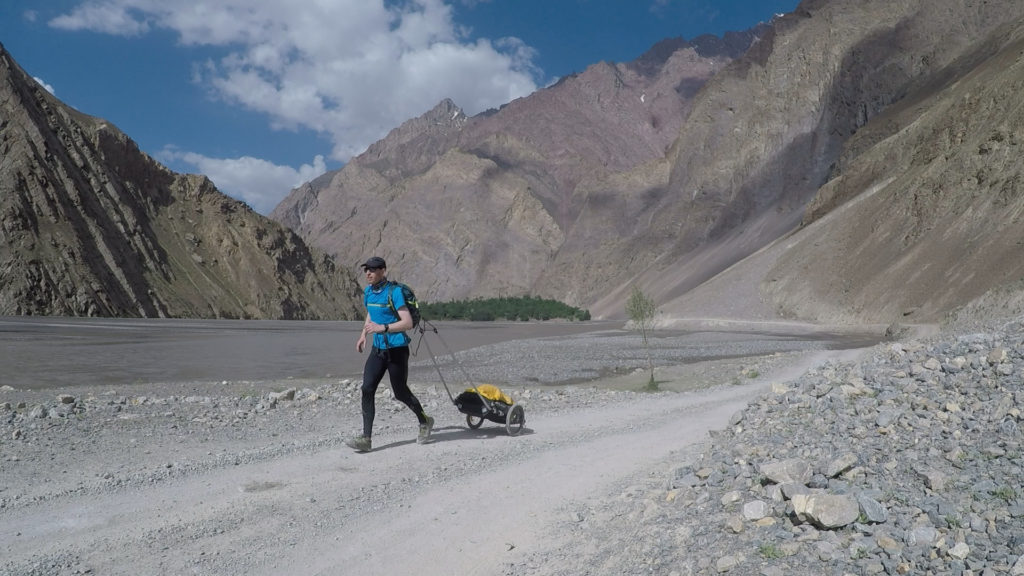
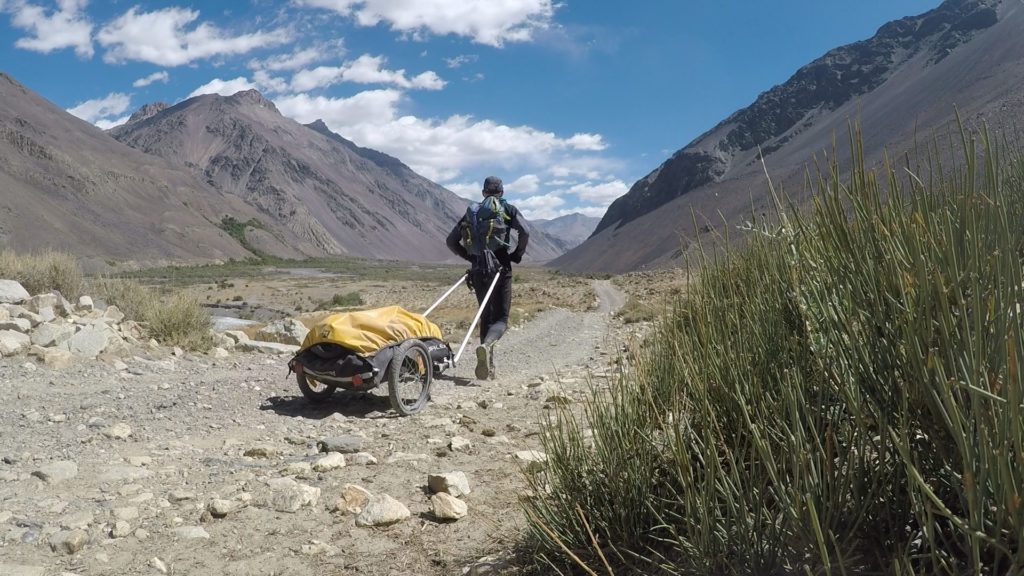
The lack of a bicycle was probably particularly noteworthy given that I was travelling with a bicycle trailer. When planning to run across Tajikistan, each route I considered presented its own particular logistical challenges, but common to all was the lack of opportunities for food and water replenishment. Although the lower Bartang Valley follows the river, as it ascends further east it transitions to a high, wild and dry plateau. Here, there would be no settlements to offer tea and bread and there were long sections where the water I’d need would be too heavy to carry on my back.
A support vehicle was out of the question. I considered independence to be a founding, non-negotiable principle of this adventure and if I couldn’t plan, organise and run it without help then I would find another destination. The consequence of this was that I was presented with a problem. How could I optimally push or pull a heavy load as I ran for 400km, often at 4000m above sea level?
I’d considered no idea to be off limits and had embarked on a series of research activities that, to a casual observer who knew no better, may have seemed quite odd. I spent a wet February afternoon walking slowly up and down London’s Kilburn High Road, discretely observing the handling and directional effectiveness of old ladies’ shopping trolleys. In Homebase, I loitered in the wheelbarrow section, prodding the wheels to gauge robustness whilst taking photos. If anyone asked, I planned to tell hem I was just an enthusiast. I was fairly confident they’d believe me.
The eventual solution was, of course, obvious in hindsight. Whilst running on Hampstead Heath, I had spotted a man on a bicycle towing a child in a small trailer to the rear. If I could swap the kid for my camping gear and supplies, and find a way of attaching it to myself that meant I was still free to run, I’d be in business.
And so, on a quiet weekday morning at home, my neighbours had bemusedly looked on as I performed a series of trials on the streets outside. Jogging uphill, downhill, around tight corners and up and down kerbs, I towed the bicycle trailer I had by now purchased and attached to the bottom of my small rucksack with a climbing sling and prusik cord. To my amazement, it worked. Though the trailer bounced as I ran, the attachment acted as a shock absorber and I could run largely unhindered. On level ground, I could barely feel any drag. A gentle incline was surprisingly manageable. As long as I stuck to roads and good quality trails, I was confident it could work.
After several days in the valley, this had proven to be the case. Though the tarmac had petered out after the first few kilometres, the subsequent dirt track was well-defined and bearing the load was doable. To add to the favourable conditions, the water level of the river was unusually low and sections that were frequently flooded and impassable were all clear.
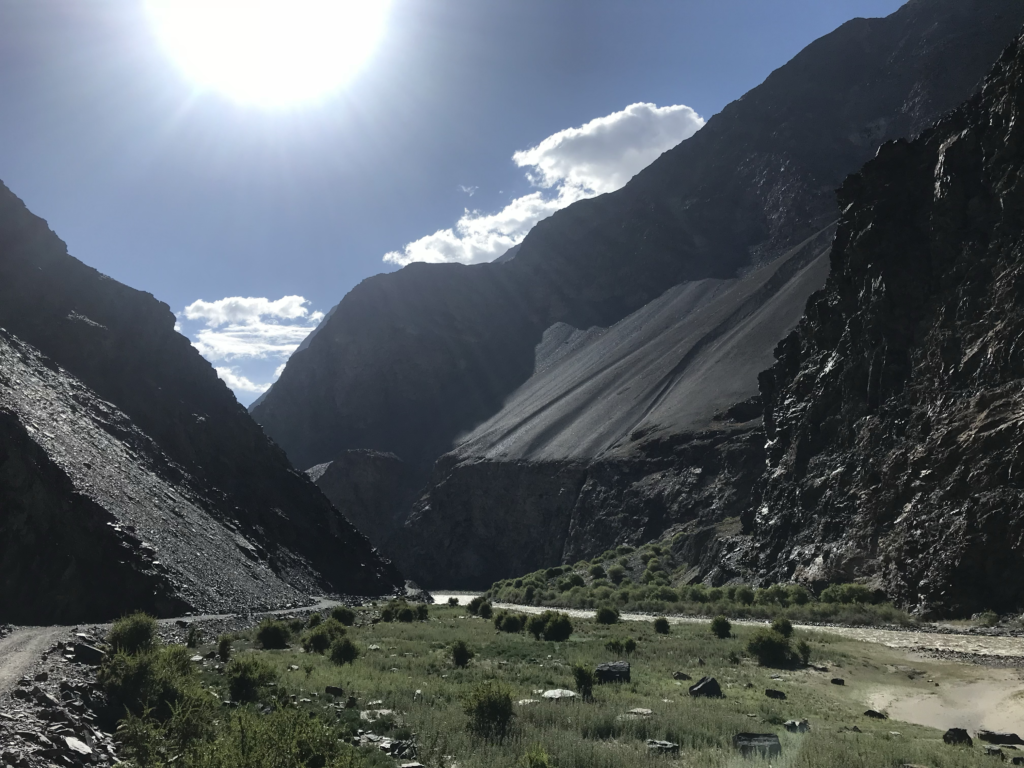
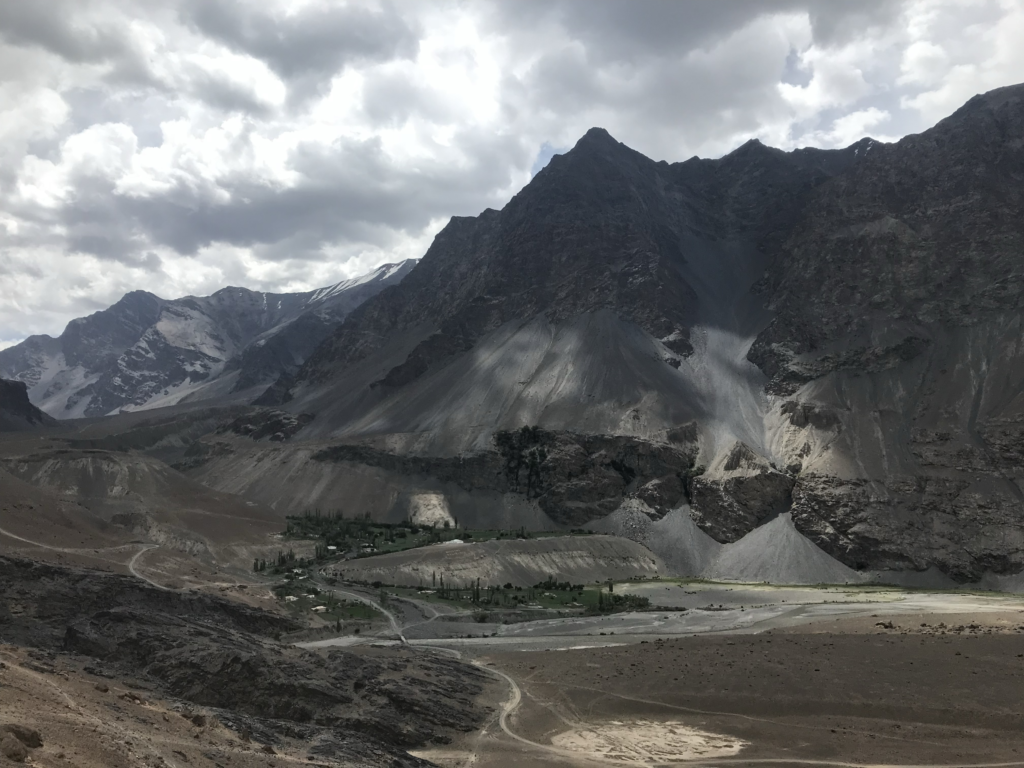
Beyond Basid, where I had even managed to find a house with a Russian satellite dish showing England’s World Cup match with Panama, things became noticeably poorer. In a small village, I wandered around for some time before two young brothers beckoned me over. Inside their home, we drank tea and ate hard bread dipped in warm milk. They made gallant efforts to converse but I knew none of the local language and could barely count to five in Russian. Still, I was tired and quite happy with the silence.
My contentment was short-lived, however, as I was soon marshalled into the house next door. An older woman was busy at the stove. Her husband was sitting as he smoked and spoke some English, which I assumed was the principal reason for my visit. It was unclear how often he got to practice, but he seemed keen to use this opportunity to the full and did so by enthusiastically expounding the merits of the Soviet Union and its superiority to what had followed its demise.
“Stalin! Great man!”. He looked at my blond hair. “German? Hitler! Great man!”. Perhaps someone with an ounce of moral courage would have responded with an appropriate rebuttal and several dozen obvious counter arguments. I looked down and said nothing. As I was leaving, I described the route I had taken so far. He raised his eyebrows. “Afghanistan?” He put one hand against his other wrist and made a sawing motion. “Taliban!”, he exclaimed, chuckling and patting me on the back.
After six days, I reached Khudara, the last village before Lake Karakul, a further four days away. The afternoon had been cold and windy and I was in a filthy mood. I’d been warned that, upon arrival, I’d likely be accosted by a man aggressively demanding money for a permit, and, sure enough, here he was, shouting at me. I felt I had prepared for this in the best possible way, which was to buy an actual permit in the city of Khorog several days before, and I now triumphantly waved this in front of him. Momentarily, he seemed crestfallen, but then bounced back and defiantly shook his head. “No, wrong permit!”.
I felt neither of us emerged from the ensuing altercation particularly well and it only served to bolster my eagerness to move on and up, away from people altogether and into the wilderness I had come for. Over the years I had spent plenty of time in high, remote places and had come to regard it as an immensely special experience – it had become my way of transcending the everyday and for gaining a peace of mind I found hard to attain through other means. The desolation of wild spaces always demanded both a physical and spiritual commitment to the natural environment, and I was relishing the encounter ahead.

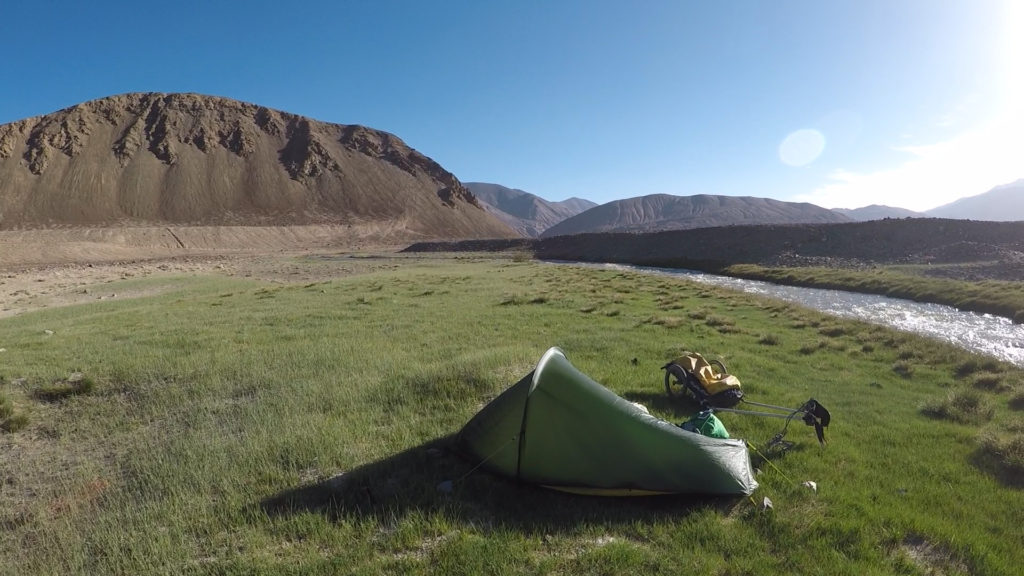
For the next few days I settled into a satisfying routine of very slow running and delightfully wild camping. I had run at altitude before, and knew that, as I approached 4000m, the best I could manage would be a slow jog with frequent stops. At times, even this proved difficult.
As I pushed on to the higher, parched terrain of the Murghab Plateau, both my sense of solitude and my reverence for the immense, looming Pamirs were amplified in equal measure. When I finally reached a thin green stripe of vegetation that lined the banks of a narrow river, I hadn’t seen another person for three days.
Sooner or later, I had expected to encounter nomads making the most of the short summer’s warmer temperatures and fleetingly viable pasture to graze their livestock. Years earlier, I had spent several weeks on the grassy steppes of Western Mongolia, camping with Mongols in their yurts and getting to know the history and traditions of their pastoral way of life. It had been rough – I’d encountered alcoholism, fist-fights and robbery – but I had retained a faith in their resilient, contrarian lifestyle that had been a privilege to share.
Here, though, the land had been vacant and it was only when Lake Karukul – the highest of the Pamir Plateau – came into view and I was nearing a reunion with civilisation that I bumped into anyone – two cyclists heading South.
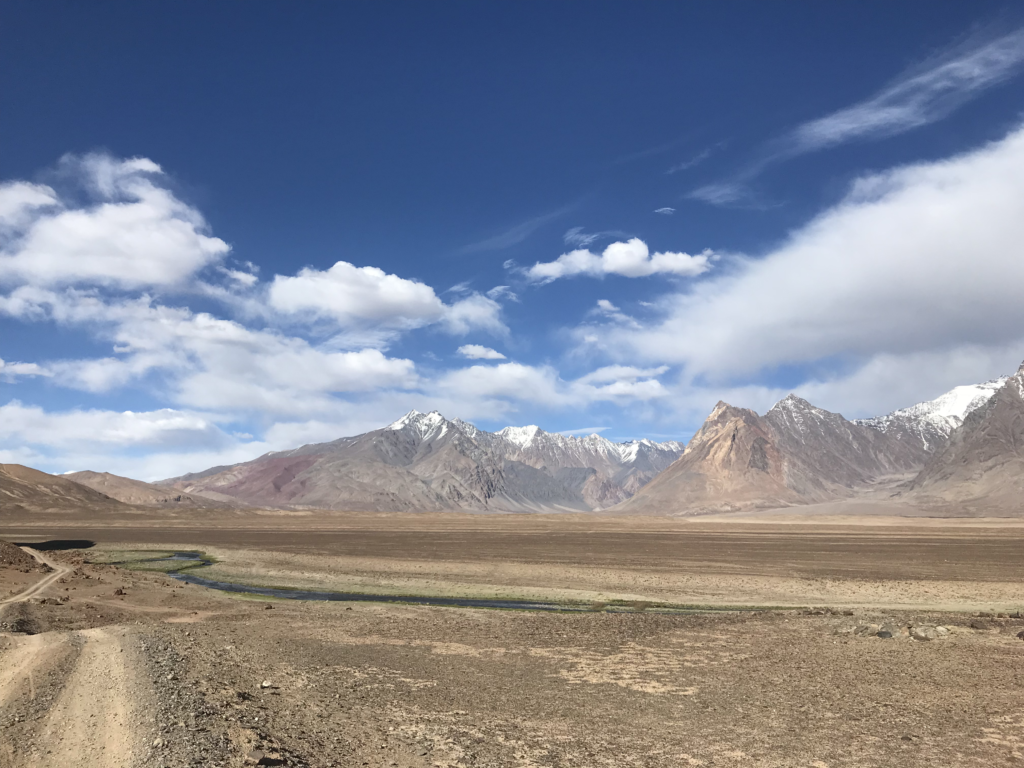
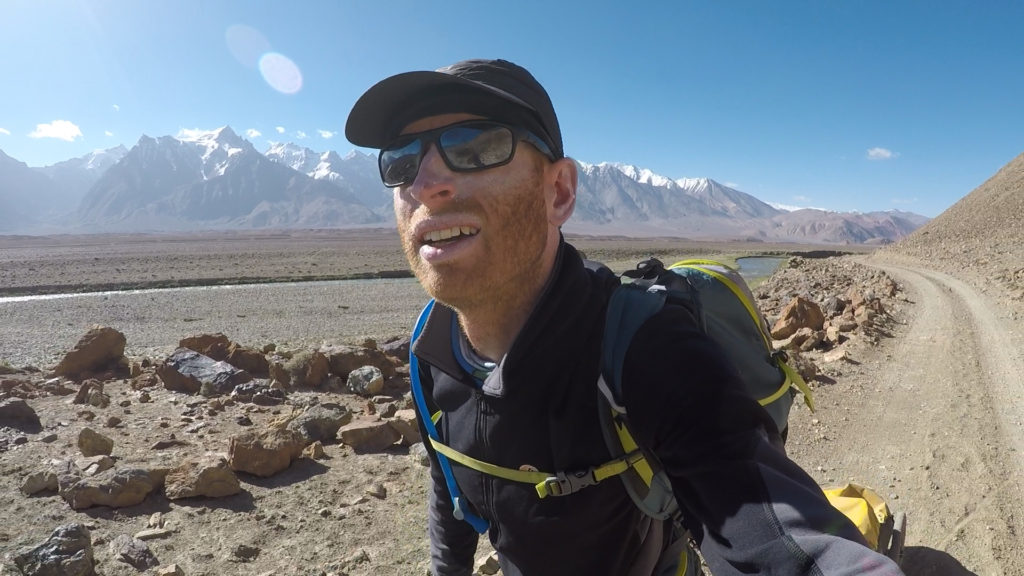
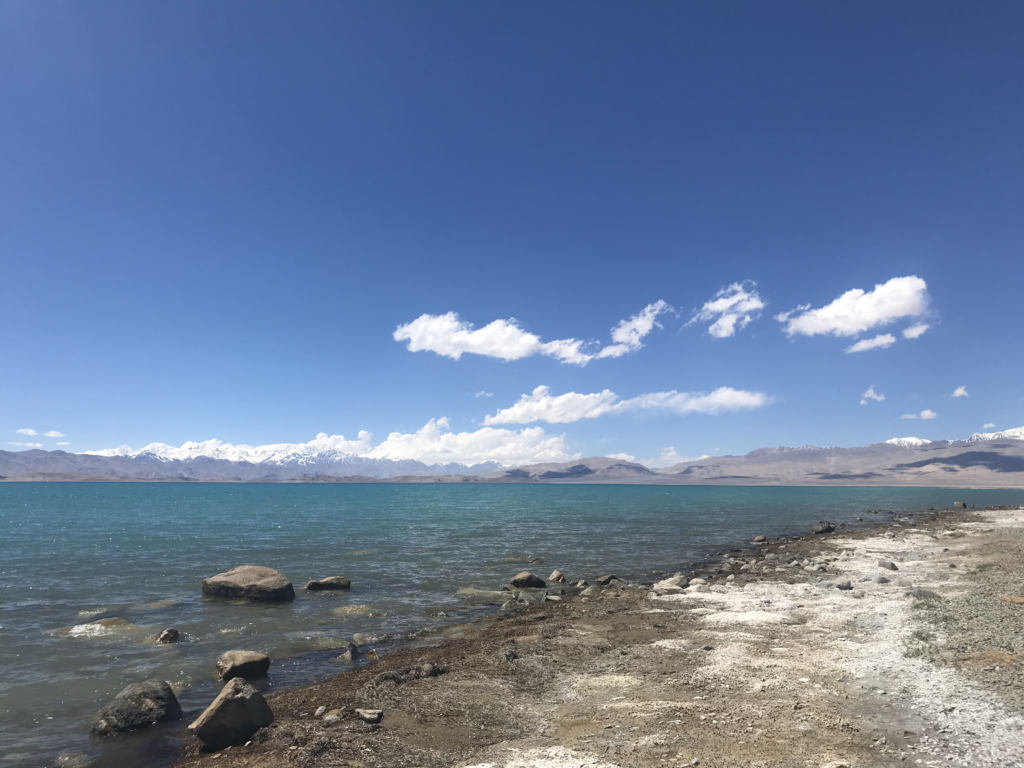
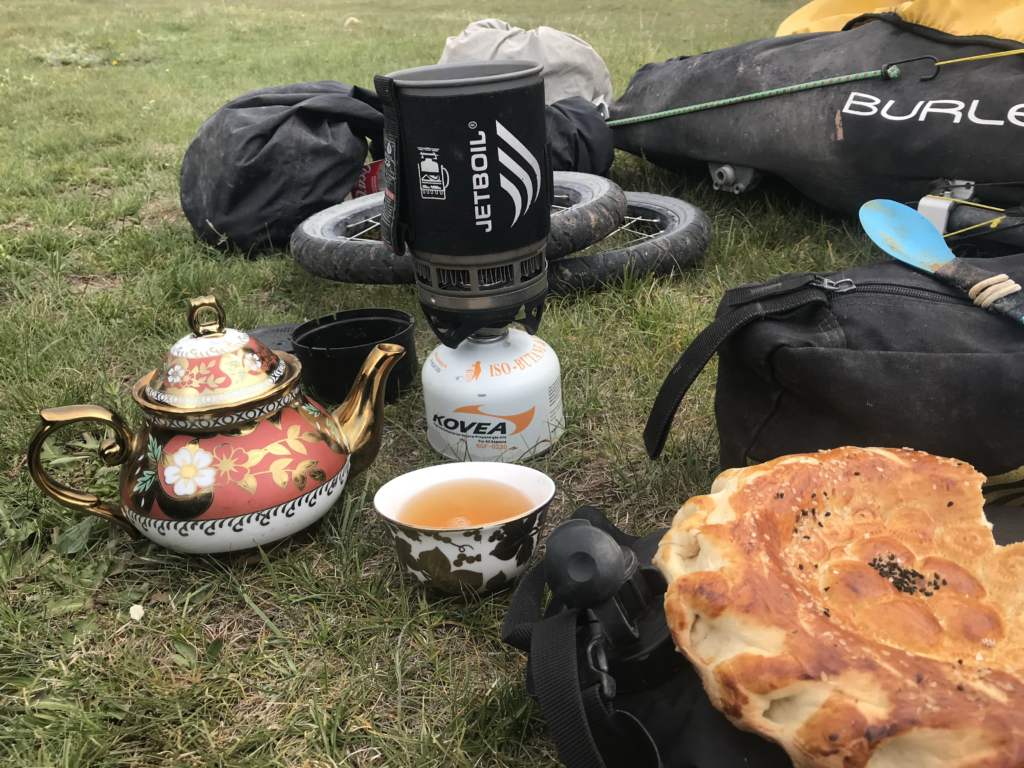
Although for the first few days of the trip I had managed to maintain an unusual degree of practical sure-footedness, and had largely kept a lid on the cack-handed ineptitude that I normally brought along with me, things had latterly returned to form.
On leaving Khudara, I had left the trailer’s compartment cover unfastened, and it was only when pausing for a rest that I realised I had unwittingly spent the morning sprinkling the path behind me with an eclectic selection of my provisions. I had retraced my route for some distance and picked up what I could, but anyone following further back would still have been able to help themselves to one shoe, a miniature camera tripod and a trail of custard cream biscuits that had slipped out one at a time from an open packet.
Now, having left Lake Karakol in the morning and run for several hours on the mostly tarmacked highway, I had been looking for a place to camp and had spotted an abandoned, dilapidated building set some way back from the road along a winding track. The roof had long since disappeared and most of the walls had collapsed, but there was one room still largely intact with a soft earth floor that would allow me to pitch my tent.
Ordinarily, this simple process would have taken less than five minutes, but the roofless room offered no protection from the vigorous late-afternoon wind and I flailed desperately whilst trying to assemble my ultra lightweight, and it turned out, ultra flimsy, set-up. In the scene of mild farce that followed, the tent’s only pole firstly snapped like a toothpick and then, as I grabbed the unanchored canopy to prevent it becoming airborne, its now-exposed jagged edge speared a six-inch hole in the flysheet.
I sat down, berating myself for my clumsiness, and contemplated the cold night that lay ahead. But then, glancing at my trailer in the corner, it occurred to me that the twin metre-long metal tubes that emerged from the front of the chassis, angled upwards to enable a waist height attachment to the person in front, could provide a frame for a makeshift shelter. It wasn’t perfect, but after some time I managed to arrange and fix the tent to the trailer to give a sufficiently sturdy, neat solution. Somehow, against the odds, this sorry episode had ended in triumph.
Despite now feeling agreeably buoyed-up, and having even begun to consider the patent potential of my new contraption, I was sufficiently self-aware to realise that in this environment, any further complacency or inattention to detail risked further disaster. I knew there was still plenty of scope for glorious failure, and so later, when it was still too windy to light a stove and I brought my JetBoil inside to make tea, I made myself maintain focus by repeating a mantra, “Don’t burn the tent down, don’t burn the tent down, don’t burn the tent down”.
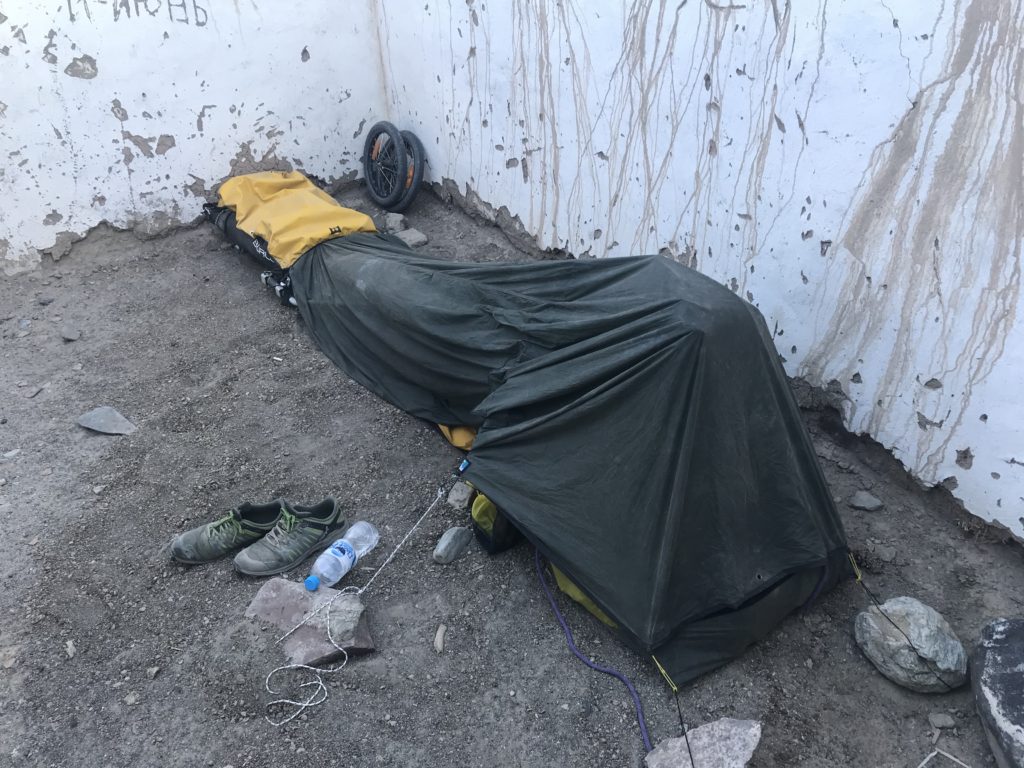
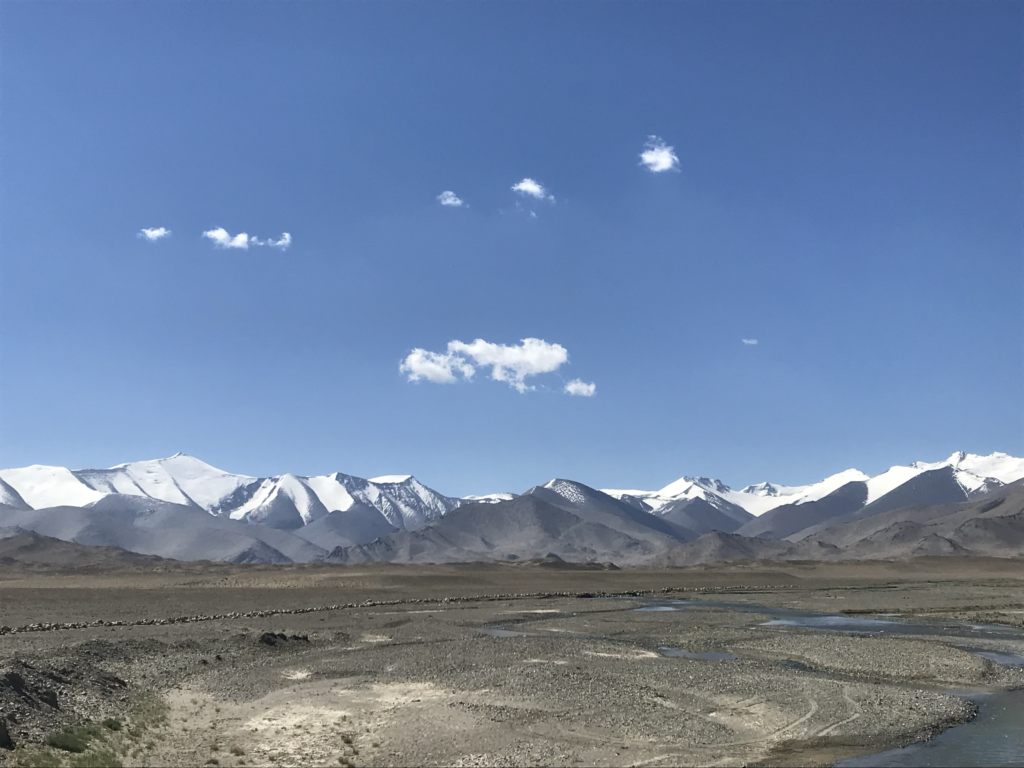
The final day saw a marked change in the weather, with blue skies replaced by colder temperatures and blustery snow flurries. There was more traffic now, and occasionally a four-wheel drive would pull up alongside me to hand over chocolate and ask if I wanted a ride. I tried to explain that, having come this far, I really would rather complete the last few kilometres by myself too, but my protestations seemed to be largely unfathomable and this process often took some time.
The border was a two-stage affair, with the Tajik exit and Kyrgyz entry posts separated by several kilometres of neutral no-mans land. Sections of the road were steep and muddy, and after nearly two weeks I was now physically drained and moving slowly. Finally, after a long afternoon, and as the snow turned to heavy rain at the lower altitude, I approached the secluded community of soldiers that signalled I had arrived at Kyrgyzstan.
Entering the passport control room, I explained my situation to the border guard sat behind his desk in military fatigues. I hadn’t expected much, but didn’t think a congratulatory handshake, or failing that, a cup of tea, was out of the question. Instead, our two very different universes collided.
“You are a stupid man”, he scolded, looking at me incredulously. “You should have a vehicle”.
I reflected on the previous few days. It would certainly have been a lot easier and safer to stay at home. Perhaps I could have achieved the quietness I sought by simply throwing my phone in the bin and sitting in the garden for two weeks, but I knew it was the physical struggle that ultimately provided the fulfilment that, after 400km, I now felt. It had been everything I had wanted it to be and, inwardly, I was delighted.
As he handed back my passport and waved me away, another guard walked in. He looked me up and down quizzically and asked, “So where is your bicycle?”.
